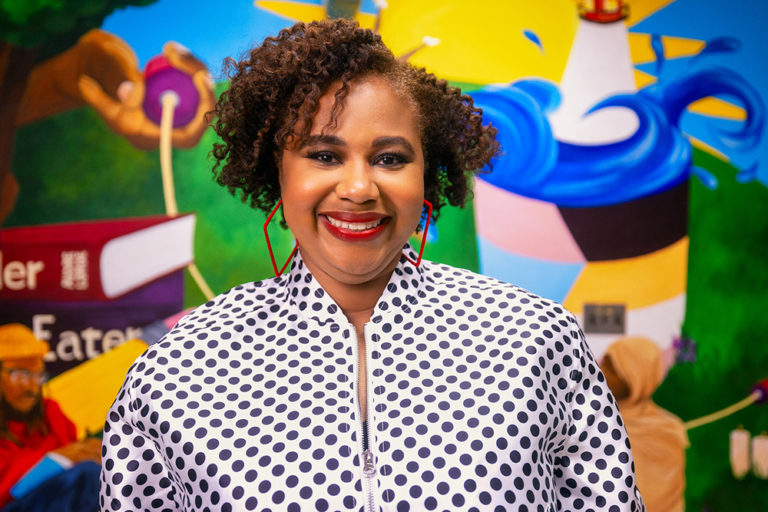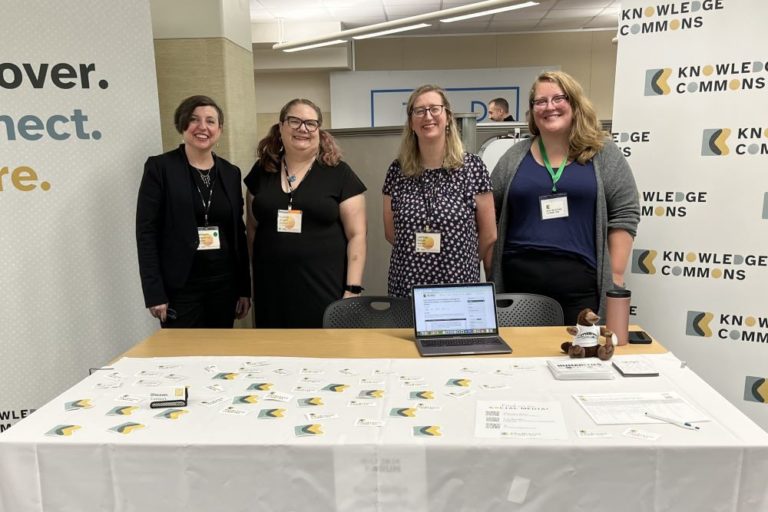
The College of Arts & Letters and Residential College in the Arts and Humanities came together last week to celebrate the 100-year anniversary of the founding of Bauhaus, a famous art school that originated in Germany and influenced a broad range of disciplines including art, architecture, graphic design, interior design, industrial design, and typography.
The commemorative events explored the idea of the Bauhaus as an institutional form as it traveled from Germany to institutions in the United States and around the world, and it focused on what universities today can learn from the Bauhaus legacy of interdisciplinary education, embodied learning, and institutional collaboration.
As part of the 100 Years of Bauhaus celebration, scholarly lectures were presented on “Looking for Bauhaus in Michigan” by Susan Bandes of MSU’s Department of Art, Art History, and Design, and “Designing Bauhaus Objects” by Carolyn Loeb of MSU’s Residential College in the Arts and Humanities. The celebration concluded with the symposium “Bauhaus as Institutional Form,” which included scholarly lectures on “Bauhaus Modern as Proposal for a New Vernacular” by Eva Forgacs of the Art Center College of Design in Pasadena, California; “The Bauhaus: A Curatorial Legacy” by Rebecca Uchill of the University of Massachusetts, Dartmouth; and “Dematerializing the Bauhaus: Gabo and Burnham in America” by Melissa Ragain of Montana State University. The lectures were followed by a panel discussion moderated by Tessa Paneth-Pollak, Director of the LookOut Gallery in MSU’s Residential College in the Arts and Humanities.
The events gave students a wonderful opportunity to explore their interests beyond the usual disciplinary boundaries.
DR. MATTHEW HANDELMAN
In addition, there were screenings of the 2019 TV miniseries, “Bauhaus: A New Era,” and a program of European avant-garde films, “For an Institute of Light: Absolute Film and Laszlo Moholy-Nagy,” organized by Department of English faculty Joshua Yumibe and Justus Nieland as part of the Broad Underground Film Series. Over the course of the week, workshops were held in art spaces across campus in which more than 100 MSU students, faculty, and staff participated. The workshops were on typography led by Rebecca Cifaldi, Marcus Fields, Arie Kolewyn, Kelly Salchow MacArthur, and Tessa Paneth-Pollak; Bauhaus costumes led by Pia Banzhaf and Steve Baibak; and marionettes.
“The events gave students a wonderful opportunity to explore their interests beyond the usual disciplinary boundaries,” said Matthew Handelman, Associate Professor in the Department of Linguistics and Germanic, Slavic, Asian, and African Languages and an organizer for the Bauhaus celebration. “Both workshops and films allowed our students in German to see the artistic implementation of what we talk about in class, and for students of the arts to get to know the cultural-linguistic milieu from which the Bauhaus’ vision of modern art and architecture emerged.”
The 100 Years of Bauhaus celebration concluded with a keynote lecture performance by director and puppetry artist Christian Fuchs, who talked about the dynamics at the early Bauhaus through the medium of an Oskar Schlemmer puppet play from 1922, “The Adventures of the Little Hunchback.” As its United States premier, Fuchs restaged this play using replicas of Schlemmer’s original marionettes.

“This centennial of the Bauhaus gives us an opportunity to ask what we want the Bauhaus to mean to us in 2019. What can the Bauhaus still teach us about an integrated arts education? What habits, on the contrary, might we want to unlearn, given the outsize influence the Bauhaus has had on design, arts education, and culture today?” said Tessa Paneth-Pollak, Director of Exhibition Spaces in the Residential College in the Arts and Humanities and an organizer of the Bauhaus celebration. “All of the week’s workshops, talks, and performances aimed to give participants different ways into and out of these questions.”
The 100 Years of Bauhaus celebration was organized by Pia Banzhaf, Assistant Professor in the Department of Linguistics and Germanic, Slavic, Asian, and African Languages; Matthew Handelman, Associate Professor in the Department of Linguistics and Germanic, Slavic, Asian, and African Languages; Yelena Kalinsky, Assistant Professor in the Department of Art, Art History, and Design; Tessa Paneth-Pollak, Director of Exhibition Spaces in the Residential College in the Arts and Humanities; Lily Woodruff, Associate Professor in the Department of Art, Art History, and Design; and Karin Zitzewitz, Chair of the Department of Art, Art History, and Design.
The celebration was supported by the College of Arts & Letters; Department of Art, Art History, and Design; Department of English; Eli and Edythe Broad Art Museum; German Studies Program in the Department of Linguistics and Germanic, Slavic, Asian, and African Languages; the Residential College in the Arts and Humanities; and the Embassy of the Federal Republic of Germany as part of their Wunderbar Together Year of German-American Friendship.
(The top photo shows students in The Creative Process class (IAH 241E), which is taught by Assistant Professor Pia Banzhaf. The students created costumes that emulate Oskar Schlemmer’s Triadic Ballet costumes with assistance of Steven Baibak and Christian Fuchs. Photo by Donte Smith, Film Studies senior)






